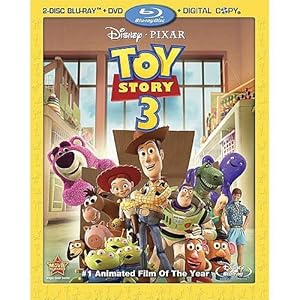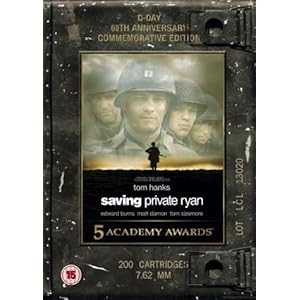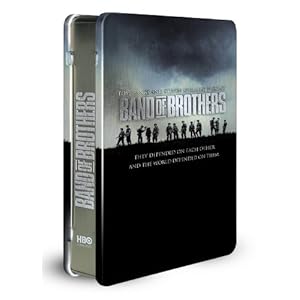
The original Toy Story was a big part of my youth, and the sequel was thoroughly enjoyable, but I've long thought of them as slightly inferior to most of Pixar's work in the last decade, when they really figured out how to be all things to all people. I haven't actually seen the first two since that perceived step up in quality occurred, but I don't think I'm far off with those feelings. So when everyone gave the third film totally glowing reviews and talked up its emotional content, I was a bit surprised, but not disbelieving. I went into the film expecting something between a competent third chapter and the best movie of all time, and that's pretty much what I got.
Toy Story 3 is the perfect conclusion to the series, and possibly my favorite work to date by the studio. It was a stroke of genius to have Andy age along with the people who were children when the first two movies came out, and the story they chose to tell managed to stay true to the adventurous, humorous spirit they had before while still telling the most emotionally engaging and mature story of the three, without dipping into depressing or maudlin territory. I'll put it this way: Up made me a bit misty with a well constructed, beautifully tragic love story at the center of its old-guy-with-balloons movie, but I partly felt like they were trying to manipulate me into feeling sad when I just wanted to have a good time. Toy Story 3 delighted and thrilled me before making me cry with a perfect little scene that just seemed to capture all the emotions involved in growing up and life moving on without seeming to need to try to.
The core cast from the first two movies is back, whittled down to all the truly essential characters, and they really are a great bunch. Obviously Tom Hanks and Tim Allen take center stage as Woody and Buzz, but the whole group is just fun to throw together and do things with. There's also a veritable ton of new characters added, both the villainous overlords at the daycare center and the friendly bunch at another kid's house that Woody meets. Most don't quite have the time to develop full personalities like the old characters, but they're all interesting enough, with some great new voices by guys like Timothy Dalton and Michael Keaton, and Lots-O'-Huggin' Bear is probably the best real antagonist Pixar has had.
The movie also looks outstanding, not exactly because of the technical excellence of the computer effects (although that's definitely noticeable in places, like Lots-O's fur), but just because of the artistry and style of the animation. Woody's floppy run and all the little character touches look a lot more entertaining than I think the animators really knew how to do with computers only a few years ago. Moments like Mr. Potato Head with the tortilla are among what's simply the best stuff people have ever done with the medium in terms of creativity and movement that's amusing to look at. And of course Pixar maintains their ability to create action sequences that are more inventive and thrilling than what most violent blockbusters are able to pull off.
Wednesday, January 5, 2011
Toy Story 3
Thursday, December 2, 2010
The Green Mile

The Green Mile is a good movie trying very hard to be a great one. It's Frank Darabont's second film from the 90s, and like The Shawshank Redemption, it is a period drama set mostly in a prison in early 20th century America, featuring a bond that forms between a white man and a black man, and based on a story by Stephen King. It also features a strong cast, and is undeniably well made even if you don't like the story. The film has an extremely stately pace and feel, almost to excess, and tugs very hard on your emotions, although it's not quite the same as Shawshank. One of the biggest reasons is that the plot actually has a supernatural element, one that would actually qualify the film as a kind of fantasy story, and one that I imagine would greatly surprise anyone who came into watching it blind, especially since this element doesn't actually surface until a full hour into the film. A lot of things are like that though, since it's three hours long when the story seems like it could have been told in two. I wouldn't say it was too long exactly, or that it ever really got boring, I just don't see what the benefit was to giving every single bit of story as much time as the producers would physically allow to develop.
So Tom Hanks is in charge of death row at a prison. Most of the prisoners are decent guys who did wrong, but the two that get brought in after the movie begins are different. Michael Clarke Duncan is a saintly giant, the ultimate version of the magical negro. Sam Rockwell is a deranged, freakish bastard. Hanks is the boss of several recognizable faces as the other guards, who are mostly good men like he is, except for Doug Hutchison's character, a privileged piece of shit with family connections who wants to watch a couple crooks fry before transferring to a better paying job. Sam Cromwell plays the warden, and Patricia Clarkson is his wife dying of a brain tumor. Those are pretty much all the pieces that will be shuffled around, as the guards learn more about Duncan's abilities and realize why he ended up getting sentenced to death for the rape and murder of two young girls. The acting is good all around, especially the two leads, with Hanks' weariness over what his job is doing to him and Duncan's otherworldly innocence, despite the stereotypical nature of the character. It really is a well produced film, and I liked the mixture of fantasy bits with an old fashioned southern drama. But it seems like the kind of thing I'd struggle mightily to ever watch again, and the whole movie is quite possibly just a bit up its own ass. Still, I liked it.
Friday, October 15, 2010
Saving Private Ryan

This is one of those movies where it seems like everyone is in it. The main cast of soldiers trekking across France is full of guys you recognize even if you don't know your names. Hey, Tom Sizemore! And Vin Diesel! And Adam Goldberg! And Giovanni Ribisi! And Ed Burns! And Daniel from Lost! And it doesn't stop there. There are plenty of other small roles without a lot of prestige but still played by famous actors. It's Bryan Cranston with one arm! And Paul Giamatti! And Ted Danson! And Dennis Farina! And one of Nathan Fillion's first roles! It honestly gets fairly distracting when you're playing spot-the-guy in the middle of an epic, dramatic war movie, but that's one of the only flaws in an otherwise quite remarkable film.
The two most significant parts go to Tom Hanks as the leader of the unit sent after Private Ryan to bring him home after his three brothers are all killed in action, and Matt Damon as Ryan himself, the object of the film, although he only shows up for the last hour. It's funny, he was cast because he was basically unknown, but by the time the movie came out he was already a celebrity. Remember that distraction thing? I spent a fair amount of time thinking "So when is Matt Damon gonna show up?" But yeah, the film itself is a remarkable one. Just a great combination of drama, acting, cinematography, and editing. The film has a washed out look to it that someone sets the tone of a period war film without having to say anything. The production values are pretty outstanding; even when nothing is blowing up, the bombed out, rubble-filled city streets and rolling countrysides always look amazing and authentic. There are many scenes of the soldiers arguing about the mission, hazing the new guy, or just killing time that always have a natural feel to them, making you believe that these men have grown used to each other through so much time training and fighting together.
And of course there are the battles. The film is bookended by two sequences nearly half an hour in length, including the famous Normandy landing scene, filled with bullets, screaming, and severed limbs. The stark brutality of it might seem exploitative to some, but I thought there was power in the harsh, blunt way it was presented. War isn't pretty, and few sequences have captured it as well as that. Besides that and the climactic final battle, there are multiple other sequences, although they're relatively brief. They're still well filmed and choreographed, and throughout all of them the different soldiers get their chances to shine, although the unit's best marksman gets a lot of the best moments. As you might expect with a war movie things don't end well for everybody, and there's actually a scene where an earlier act of good will has negative consequences, which made me wonder for a bit what exactly the script was trying to say. Although in some ways the film romanticizes heroic sacrifice, it's still effective at conveying what it really does to people. One of Steven Spielberg's best films, and an effective jumping off point for the HBO miniseries that followed.
Thursday, May 20, 2010
The Pacific

The Pacific is pretty similar to Band of Brothers, its spiritual predecessor, though if you expect it to be exactly the same you might be disappointed. Whereas Brothers told a single, continuous story about an entire company from their training until the end of the war, Pacific focuses on three individual soldiers who barely even cross paths, jumping to various important times in their serivce to show things from their perspectives. Also, the enemy is Japanese rather than German, but that goes without saying.
One of the things The Pacific impressed on me is how much more brutal that theater was. I mean, Europe was no picnic. The Nazis did some pretty horrific stuff, and no war is pleasant. But at least they weren't enduring constant rain, sleeping in the mud, and dealing with enemy soldiers that simply refused to ever surrender. There's a twinge of racism through the whole thing, as many of the American troops viewed the "Japs" as something less than human, and their sadistic glee when given a helpless victim is sometimes frightening. But there's a point to all of it. The war was terrible on everyone involved, and you can see how some less than flattering ideas would be attached to such an enemy. This is the most clear with Eugene Sledge, one of the three leads, who starts the war as an idealistic Christian, but finds himself saying he'll kill them with his bare hands if he has to before the end. It's a violent series, but some of the worst parts have nothing to do with the battles. Soldiers committing suicide during a morning shower, stumbling upon gutted civilians who still haven't managed to die yet; you can tell that the goal was conveying how bad war really is, and it's mostly effective. A few bits hit you over the head too much, but what they're saying is pretty important.
Although nobody really stands out that much, the acting is pretty good. The leads are all solid, investing you in their individual stories, whether they're stuck in the trenches or enjoying a bit of time away from the front. And the direction is extremely strong, especially on the battles. I don't mean to sound like I'm glorifying the violence after everything in the last paragraph, but like Brothers, one of the series' strongest elements is the sheer quality of the production during combat. A single extended take of Sledge's first real taste of war at Peleliu, crawling up the beach, watching people fall around him, is one of the most stunning images I've ever seen. There's a surprising amount of variety considering the pervasive tropical island backdrop, as the soldiers do everything from fend off ambushes in the dead of night with the blinding flash of machine gun fire keeping things barely comprehensible, to insane charges through fields of artillery fire in the middle of the day, to a rainy, unnervingly quiet skirmish where the characters' biggest concern is finding mortar rounds that aren't wet. There's a fair amount of drama and heartbreak and laughter to mix things up, and while it didn't touch me as much as Brothers, it's still a great accomplishment and probably the last miniseries of this scope we'll see, at least for a while. Worth watching for anyone who cares about what it sometimes takes in this world to get some peace.
Monday, March 15, 2010
Band of Brothers

Steven Spielberg and Tom Hanks' The Pacific just started airing last night, so it seemed like a good time to revisit its counterpart in the European theater, Band of Brothers. It's a miniseries that war movies wish they could be, telling the stories of a very important company throughout their struggles without any sacrifices made in production value over its more than ten hours of running time. At times it's quite violent, though it doesn't really cross the line to gratuitous, and three of the episodes feature no combat whatsoever. A lot of the best moments just look at the friendships that formed between the troops and how they tried to cope with the constant danger they lived in, though that's not to say the battles aren't impressively done. The frantic camerawork, the well-considered but brutal situations they're fighting through, the strong visuals and amazing sound work make every fight exciting and harrowing no matter how many times you watch them. I feel like the presentation of the cast could have been a bit clearer, because names and ranks fly by at a rapid pace and even after seeing it three times I still can't match every single name with a face. For the most part you remember the main guys pretty well, and they effectively convey the "brothers" theme through the whole thing. Sometimes random troops die and that's just war, but every time someone you recognize gets killed or seriously injured it's like a dagger through the heart. I don't know how anyone can watch this and see the interviews with the surviving members and not feel immense respect for these soldiers. I hope The Pacific can successfully hit the right notes too.

































